Diving into a warm, inviting pool, even on chilly mornings, is a luxurious way to kickstart your day.
A pool heater is more than just a seasonal luxury; it’s an investment into your home and lifestyle that boosts the usability and value of your pool.
Pool heaters come in a variety of types, each with its own pros and cons. Understanding these options will help you choose the best heater for your needs and budget, providing you with a comfortable and enjoyable pool experience.
Let’s dive into the deep end and explore everything there is to know about pool heaters!
The Importance of a Well-Heated Pool
A well-heated pool does more than simply provide a comfortable swim. It also brings significant health benefits.
The warmth from the water can relax your muscles, improve circulation, and even provide therapeutic benefits for people struggling with arthritis or muscle injuries.
Furthermore, if you’re training or exercising in your pool, heated water ensures your muscles stay warm and flexible, reducing the risk of injury.
In addition, a heater increases the usability of your pool, extending the swimming season beyond the summer months.
Whether you want to have a relaxing evening swim in autumn or a fun pool party in spring, a pool heater allows you to make the most out of your investment.
Finally, from a property value perspective, a well-heated pool can increase your home’s appeal. It suggests a luxury lifestyle, potentially attracting more buyers and a better price if you ever decide to sell.
Pool Heaters 101: The Basics
Pool heaters are devices that regulate the temperature of your swimming pool. They work by using energy – whether from gas, electricity, or the sun – to produce heat, which is then transferred to your pool’s water.
While heating technology and efficiency can vary dramatically between types, all pool heaters aim to amplify your swimming experience.
There are mainly three types of pool heaters:
- Gas heaters
- Heat pump heaters
- Solar pool heaters.
Each type has its unique working mechanisms, benefits, and drawbacks, which we’ll discuss in detail below.
Before we begin exploring the various options, let’s explore the five things that can help you find the perfect heater for your pool.
5 Things to Consider When Choosing Your Pool Heater
1. Assessing Your Needs and Preferences
Choosing the right pool heater starts with assessing your needs and preferences.
Consider how frequently you use your pool, the desired water temperature, the size of your pool, and your local climate.
If you only use your pool occasionally and need it heated quickly, a gas heater might be the best option.
If you’re looking for an energy-efficient, eco-friendly solution and you use your pool regularly, a heat pump or solar heater could be a better choice.
2. Budget Considerations
Budget plays a significant role when choosing a pool heater. When setting your budget, you’ll need to consider both the upfront costs and the ongoing costs.
Gas heaters tend to have lower initial costs but higher operating costs due to their fuel consumption.
On the other hand, heat pumps and solar heaters may have higher upfront costs but lower operating costs over time.
3. Energy Efficiency and Environment Impact
As we become more conscious of our energy consumption and its environmental impact, the energy efficiency of pool heaters has become a key consideration.
If reducing your carbon footprint is important to you, you might want to consider solar heaters or heat pump heaters. Both of these options are more energy-efficient and have lower carbon emissions compared to gas.
As an added bonus, higher energy efficiency often means lower energy bills as well, making this an important consideration from both an environmental and economic perspective.
4. Climate and Weather Considerations
The typical weather you experience in your area is another crucial factor when choosing a pool heater.
If you live in a region with lots of sunshine, a solar heater can be a great choice. However, if you’re located in a colder climate, a gas heater or heat pump may be more suitable.
It’s also worth considering the average air temperature and wind conditions, as these can affect the rate of heat loss from your pool and, thus, the effectiveness of your pool heater.
5. Size and Heating Capacity
The size of your pool and the heating capacity of the heater are directly correlated.
Larger pools require heaters with greater BTU (British Thermal Unit) ratings to effectively raise the water temperature.
Similarly, if you prefer a higher water temperature, you’ll need a heater with a higher heating capacity.
Ensure you accurately calculate the volume of your pool and consult with professionals or heater manufacturers to find a heater that is adequately sized for your pool.
An undersized heater will struggle to effectively heat your pool, while an oversized heater may lead to unnecessary energy costs.
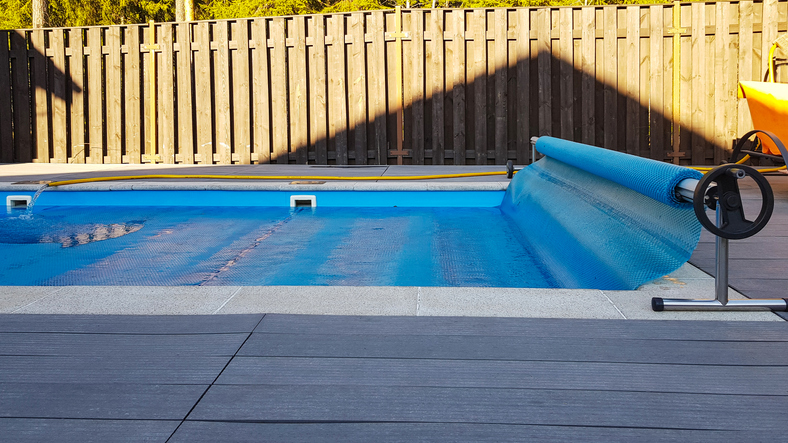
Easy Ways To Improve Your Pool’s Natural Heat Retention
Evaporation is a critical factor in pool heating. When your pool water evaporates, it carries away heat with it, causing the pool to cool.
Covering your pool when not in use can significantly reduce evaporation, thus preserving your pool’s heat and reducing energy costs.
Additionally, the surrounding environment also plays a role. Heat loss can occur due to wind exposure and cool air temperatures.
Therefore, the location and weather conditions are important considerations when it comes to deciding if a pool heater is a good fit, and which one would best meet your needs.
The 3 Different Types of Pool Heaters
1. Gas Heaters
Gas heaters use natural gas or propane to heat your pool. They operate by burning the gas in a combustion chamber, which heats a series of copper coils (the heat exchanger).
Your pool water is then pumped through these heated coils, warming the water before it returns to your pool.
Gas heaters are known for their fast heating speed and ability to heat a pool to higher temperatures regardless of the ambient temperature.
This makes them an excellent choice for pools in colder climates or pools that are used less frequently.
Pros and Cons
The major advantages of gas heaters are their speed and effectiveness.
They are also independent of air temperature, providing consistent performance in various weather conditions.
However, gas heaters have some drawbacks.
They generally have lower energy efficiency compared to other types of heaters, which can lead to higher operating costs.
They also require a continuous supply of natural gas or propane, which may not be readily available or cost-effective in all areas.
Additionally, the combustion process releases emissions, which may not be ideal for environmentally conscious pool owners.
Heat Pump Heaters
Heat pump heaters work by extracting heat from the surrounding air, intensifying it, and transferring it to the pool water.
The process starts with a fan that captures outside air and directs it over an evaporator coil. This coil contains a special liquid refrigerant that absorbs the heat from the air and turns it into a warm gas.
This gas then passes through a compressor that further intensifies the heat, which then flows through a heat exchanger, transferring the heat to your pool water.
Heat pump heaters are highly efficient and effective for maintaining a consistent pool temperature, making them ideal for regular pool use.
Pros and Cons
Heat pump heaters are incredibly energy-efficient, making them cost-effective in the long run despite their higher upfront cost.
They’re also environmentally friendly as they utilize heat from the environment rather than burning fuel.
However, their performance is dependent on the outside air temperature, which means they work best in warmer climates where the air temperature typically stays above 50°F.
For most people, this still allows them to enjoy their pool much later into the fall season, and earlier in the spring, making them a great option for many.
Another stark difference from their gas counterparts is that heat pump heaters have a slower heating speed.
Solar Pool Heaters
Solar pool heaters leverage the sun’s energy to heat your pool.
They consist of solar collectors—panels that absorb the sun’s heat—and a pump that circulates pool water through these heated collectors.
As the water passes through the collectors, it absorbs the heat before returning to your pool.
Solar heaters are an excellent choice for regions with ample sunlight, and they’re the most environmentally friendly option for heating a pool.
Pros and Cons
Solar pool heaters have the lowest operating costs among all pool heaters as they rely on the sun’s energy, a free and renewable resource.
They’re also environmentally friendly, producing no emissions. Plus, they’re known for their longevity, with many models lasting upwards of 15 years with proper maintenance.
On the downside, the performance of solar heaters depends largely on the availability of sunlight, making them less effective in cloudy or colder climates.
Solar heaters also have the slowest heating speed among all heater types and typically require a larger surface area for their installation.
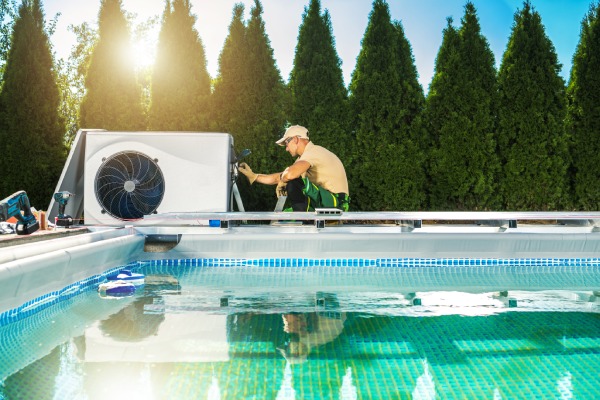
Exceptional Pool Heaters at Sun Pools
At Sun Pools, we know everyone’s needs are different, which is why we carry a range of pool heaters.
Here are three of our top models by Hayward.
Hayward H-Series Induced Draft Gas Heaters
The Hayward H-Series gas heaters offer reliable, efficient heating with their innovative induced draft technology.
These heaters are known for their high heating performance, even in windy conditions, thanks to their forced draft system.
Hayward Heat Pumps
Hayward Heat Pumps provide a high-efficiency, environmentally friendly heating solution.
With their Titanium Heat Exchanger and quiet operation, these heat pumps offer consistent heating and longevity.
They’re a great option for swimming pools that have 13,000 gallons of water or less.
Hayward HP50HA Heat Pump
The Hayward HP50HA is a compact yet powerful heat pump ideal for smaller pools.
Despite its size, it packs a heating capacity of 50,000 BTU.
Furthermore, with its included cooling mode, you can easily lower the temperature of your water on days when the temperature surges, maximizing the efficiency of your treatment products.
The Best Pool Heater Alternative
Are you considering investing in your first pool and want to enhance its usability by pairing it with a heater from day one? Consider a swim spa instead!
The perfect combination between a pool and a hot tub, these units offer a robust range of benefits that far exceed traditional pools.
Between their toasty warm water, hydrotherapy jets, and powerful swim current, your options for how to use your pool just got put into overdrive!
Best of all, their compact size makes them perfect for people with smaller backyards, while their perfectly heated water ensures year-round usability, even as the snow falls around you!
Pool Heaters For Sale in Green Brook, NJ
Choosing a pool heater doesn’t have to be a daunting task.
By understanding the different types of heaters, their pros and cons, and factoring in your specific needs and conditions, you can find a heater that is perfectly suited for your pool.
With the right heater, you can enjoy your pool year-round, regardless of the weather outside.
If you have a pool and want to experience a whole new way to enjoy your time in the water, stop by Sun Pools and talk to one of our experts.
They’ll be happy to help you find the perfect solution to meet your needs, and answer any questions you may have.
Contact us today, or stop by our showroom to get started.

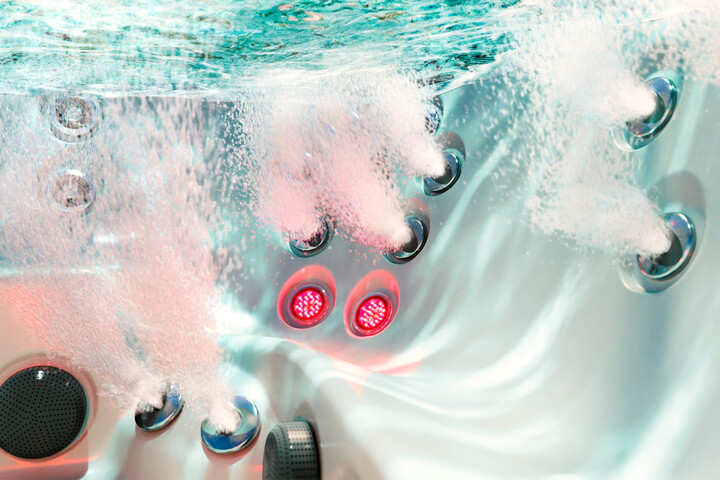
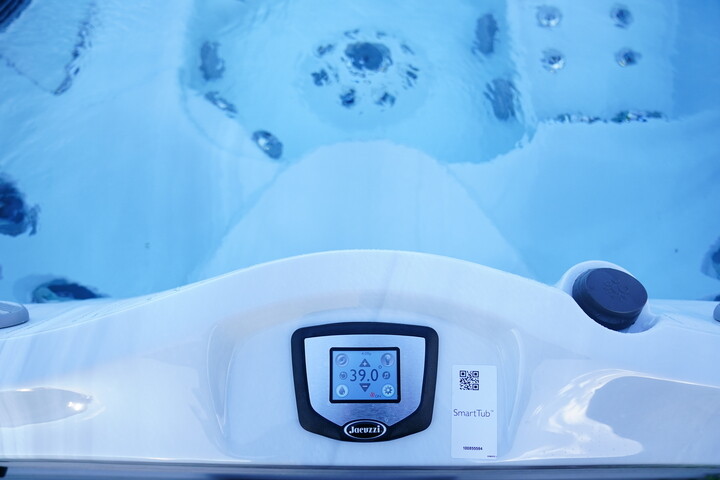
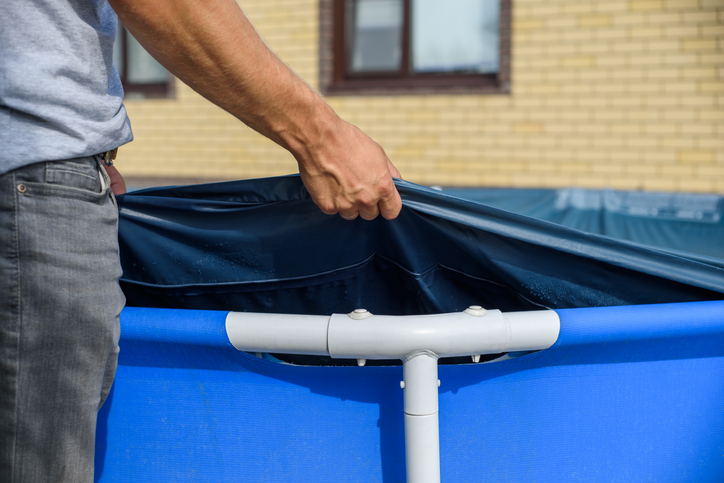

 by
by 